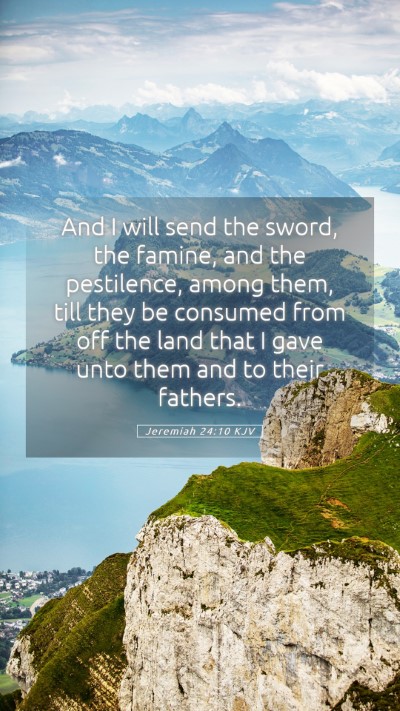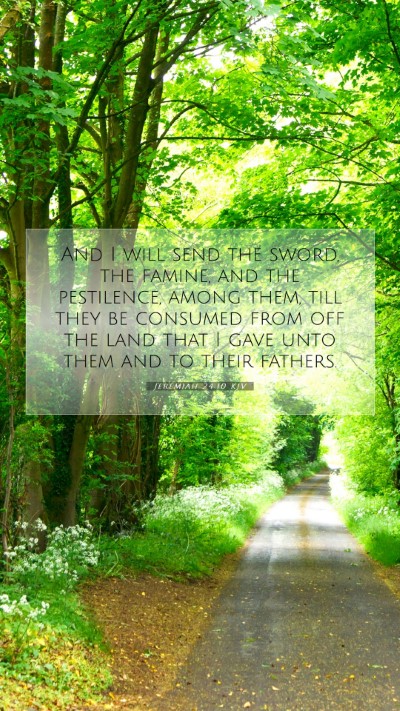Understanding Jeremiah 24:10
Jeremiah 24:10 states:
"And I will send the sword, the famine, and the pestilence among them, till they be consumed from off the land that I gave unto them and to their fathers."
This verse is a somber pronouncement of judgment upon the people of Judah. It reflects God's sovereign authority over nations and highlights the consequences of disobedience. Below, we will explore a comprehensive understanding of this scripture through insights from public domain commentaries.
Bible Verse Meanings: General Overview
The context of Jeremiah's prophecy is critical for understanding this verse. Jeremiah prophesied during a time when Judah was facing impending destruction due to their rebellion against God. This verse encapsulates the severe consequences of their actions, signifying that God’s patience has limits, and judgment is imminent.
Commentary Insights
-
Matthew Henry's Commentary:
Henry emphasizes the gravity of God's warning. He interprets "the sword, the famine, and the pestilence" as symbols of complete devastation. These elements signify God's instruments of judgment, making clear that rebellion against God leads to dire consequences. The imagery suggests a totality of destruction that would remove the people from the land that was meant for them.
-
Albert Barnes' Notes:
Barnes notes that the three forms of judgment reflect different facets of God's wrath. The sword represents violence and external calamity, famine indicates scarcity and suffering, while pestilence suggests disease and internal decay. Together, they illustrate a comprehensive approach to divine judgment aiming to drive the point home to the people regarding the seriousness of their sin.
-
Adam Clarke's Commentary:
Clarke elaborates on the prophetic nature of Jeremiah's message. He points out that this verse not only predicts the physical demise of the people but also serves as a spiritual wake-up call. The promised "sword, famine, and pestilence" are seen as necessary to fulfill God's covenant and restore righteousness among His people. Clarke highlights the eventual restoration that follows judgment, emphasizing the redemptive nature of God's plan.
Deeper Biblical Exegesis
When engaging in biblical exegesis, it’s essential to consider the broader themes present in Jeremiah. This prophecy ties into the larger narrative of Israel’s disobedience and God’s covenant loyalty, even in the face of sustained unfaithfulness.
Understanding this verse requires acknowledging the significance of covenant relationships in the Old Testament, where disobedience results in serious repercussions. Such insights are critical for Bible study groups seeking to explore Old Testament themes of judgment and mercy.
Application of Jeremiah 24:10
The implications of Jeremiah 24:10 extend into contemporary life. The message warns against complacency and highlights the need for genuine repentance, reminding readers that ignoring God’s commandments can lead to personal and communal devastation. This understanding can be applied in online Bible study settings to encourage discussions on how judgments manifest in various forms today.
Historical Context
To fully grasp the meaning of this verse, it's vital to consider its historical context. Jeremiah prophesied during a tumultuous time in Judah's history, marked by political instability and spiritual decay. The societal rebellion against God made these severe warnings necessary.
Sociopolitical factors, including the Babylonian threat, significantly influenced this prophetic message. Such historical background is crucial for creating robust Bible study guides that aid learners in comprehensively understanding the significance of each passage.
Additional Cross References
This verse aligns with several other Scriptures that address judgment and repentance. Here are some key cross references:
- Deuteronomy 28:15-68 - Describes the curses of disobedience to God's commandments.
- Ezekiel 14:21 - Speaks on the severe punishments to come upon the land for rebellion.
- Revelation 6:8 - The imagery of widespread death through various means, akin to the judgments described in Jeremiah.
Conclusion
Jeremiah 24:10 serves as a potent reminder of the consequences of sin and the seriousness of God’s judgment. By studying this verse and its commentary, believers can cultivate a deeper understanding of scripture, enhancing their Bible study insights and appreciation for the overarching themes present in both the Old and New Testaments.


